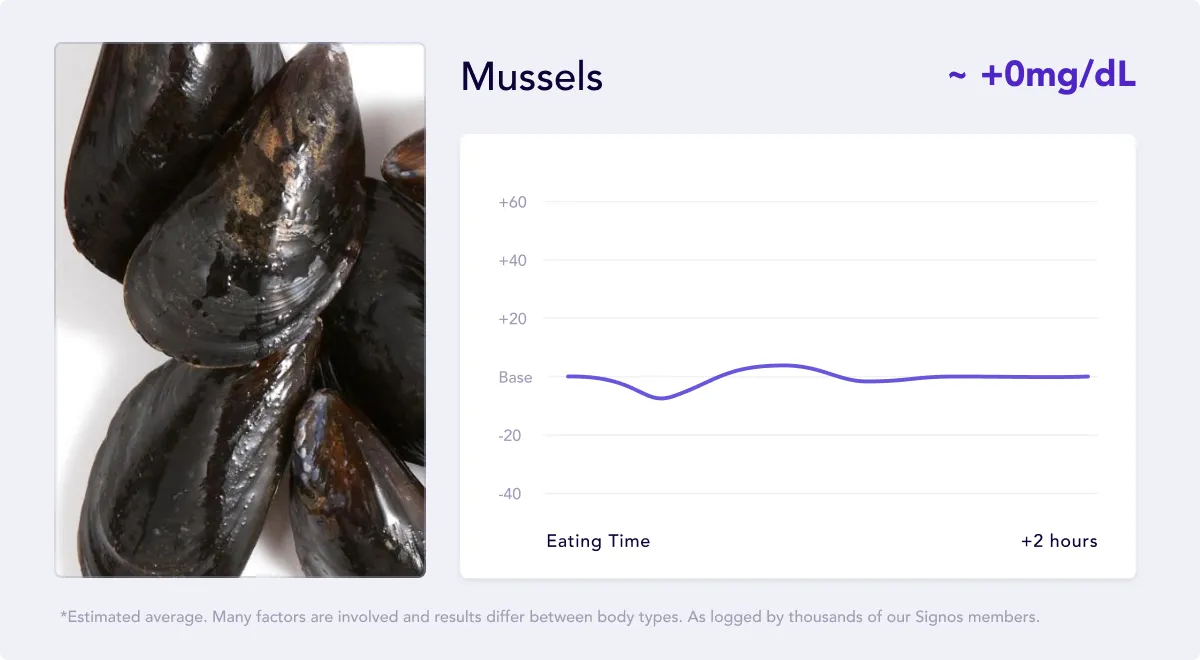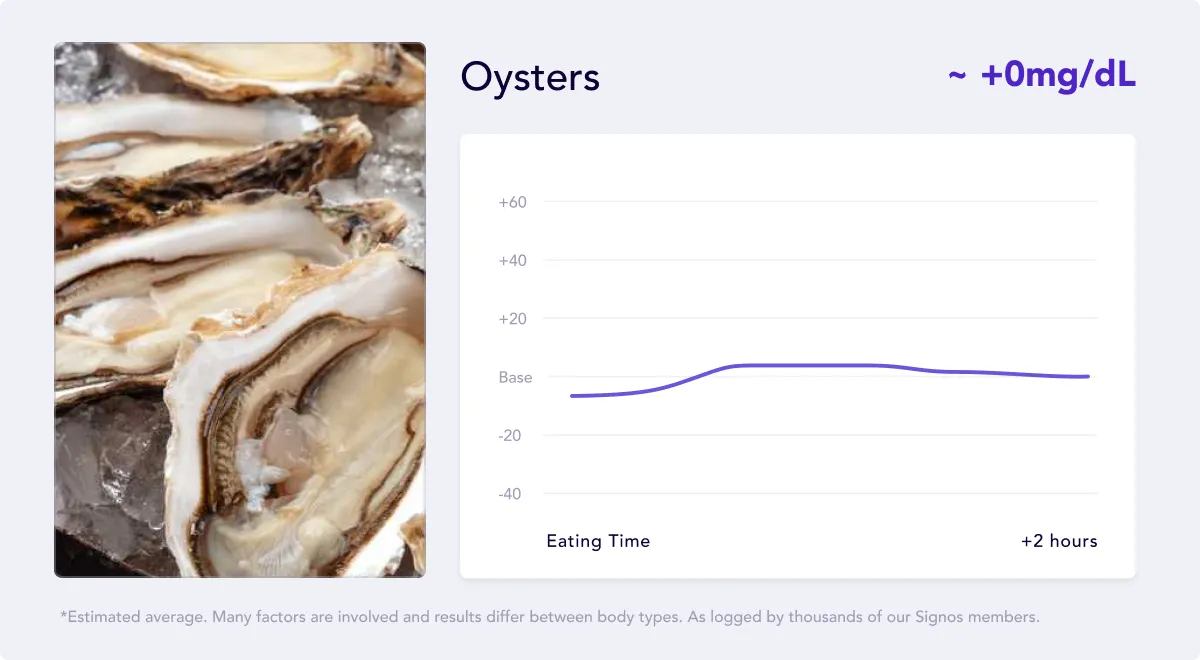In an ocean of seafood, mussels, and oysters often find themselves grouped together as mollusks, yet they have key differences. Let’s unravel the misconception surrounding these two shellfish by shedding light on their unique qualities. While mussels and oysters share the common trait of being bivalve mollusks, they diverge in their nutritional profiles and culinary usefulness.1
Mussels are a better source of protein and some vitamins and minerals like manganese and selenium. Conversely, oysters are lower in fat and protein, but a rich source of zinc and copper. Read on to review the main differences between mussels and oysters, providing an overview of their flavors, textures, and nutritional compositions.

What Is the Difference Between Mussels and Oysters?
Mussels and oysters, similar to clams, though both belong to the bivalve mollusk family, meaning they grow their shells over time, both have some differences. Texturally, mussels are known for their tender and succulent flesh, while raw oysters have a firmness and delicate texture when cooked. Mussels have an oblong shape, while oysters are often flat and round. Mussels are generally smaller than oysters but have a large size range. Mussels often boast a dark blue-black shell, while oysters tend to have a lighter, more neutral-colored shell. Taste profiles differ, with mussels offering a slightly sweeter and more pronounced flavor, while oysters exhibit a briny, subtle taste.
What Are Mussels?
Mussels are bivalve mollusks characterized by a dark blue-black shell with a smooth, elongated shape. These shellfish are renowned for their flavorful and tender meat housed within the protective shell. Mussels, particularly found in saltwater habitats, are nutrient-dense shellfish, a good source of protein, vitamin B12, iron, and omega-3 fatty acids. However, freshwater mussels do not seem to have the same source of heart-healthy omega-3s.2 As a sustainable source of protein, mussels are considered an environmentally sustainable seafood choice, as they are filter feeders, contributing to water purification and minimizing environmental impact.
One popular cooking method is steaming them in a fragrant broth, often with garlic, white wine, and herbs. This cooking technique allows the mussels to absorb the flavors of the broth while preserving their natural tenderness. They are also frequently included in pasta dishes, seafood stews, and as a component of mixed seafood platters.
What Are Oysters?
Oysters are also bivalve mollusks, characterized by a hard, irregular-shaped shell that encases tender, flavorful seafood. These shellfish are known for their briny taste. Oysters are nutrient-dense seafood packed with essential nutrients like zinc, vitamin B12, iron, and omega-3 fatty acids.
Frequently served as a delicacy, raw on one-half of the oyster shell, allowing diners to appreciate their fresh, briny flavor. They are often accompanied by condiments like mignonette sauce, cocktail sauce, or a squeeze of lemon. Additionally, oysters can be enjoyed cooked through methods such as grilling, baking, or frying, enhancing their flavor and texture.
Which Is Better: Mussels or Oysters?
When choosing between mussels and oysters, consider your personal preferences, culinary uses, and nutritional profiles. From a nutritional standpoint, both shellfish have benefits. Mussels are a rich source of protein, omega-3 fatty acids, vitamin B12, and iron. A study published in Nutrients highlighted the nutritional value of mussels, emphasizing their potential role in supporting cardiovascular health due to their omega-3 content.3, 4
On the other hand, oysters boast high levels of zinc, essential for immune function and wound healing. A study in Biomolecules underlined the significance of zinc in immune health, emphasizing the potential benefits associated with its consumption.5
Nutrition
Mussels and oysters are both nutrient-dense shellfish. They offer distinct nutritional profiles, each with its own set of health benefits.
Mussels are an excellent source of high-quality protein, omega-3 fatty acids, vitamin B12, iron, zinc, and selenium. A 3-ounce serving of cooked mussels provides around 20 grams of protein, meeting a significant serving toward your daily protein needs. Mussels are particularly rich in B vitamins, with vitamin B12 playing a crucial role in nerve function and the formation of red blood cells. They are also a notable source of omega-3 fatty acids, supporting heart health. Lastly, mussels contain minerals like iron for oxygen transport and zinc for immune function.
Oysters are prized for their high zinc content, a valuable mineral for immune function and wound healing. A 3-ounce serving of oysters provides an impressive amount of zinc, surpassing the recommended daily intake. Oysters are also rich in vitamin B12, iron, selenium, and omega-3 fatty acids. The omega-3 fatty acids in oysters may contribute to cardiovascular health. Moreover, the iron content is beneficial for preventing anemia, and selenium acts as an antioxidant, protecting cells from damage.
While both mussels and oysters are nutrient powerhouses, the choice between them depends on individual taste preferences, culinary applications, and specific nutritional needs. Incorporating a variety of shellfish into the diet can contribute to a diverse and nutrient-rich eating pattern.
Glycemic Index
Mussels and oysters are primarily protein sources with very little carbohydrate content, so they have a quite low glycemic index. The glycemic index measures the impact of carbohydrate-containing foods on blood sugar levels. As both mussels and oysters are low in carbohydrates, they do not significantly affect blood glucose. Given their minimal carbohydrate value, their glycemic response is 0 on the index. A diet rich in low-GI foods can benefit weight management and reduce the risk of chronic diseases.
The Optimal Glucose Range after eating these shellfish is less than 140 mg/dL two hours after eating your meal for folks who do not have diabetes. However, since these foods are rich in protein and low in carbs, their low glycemic properties should result in low variability in post-meal blood sugar fluctuations. However, if you eat a carb with your seafood here, you can expect a natural rise in blood sugar levels.
Incorporating mussels and oysters into a balanced diet provides essential nutrients and aligns with blood sugar-friendly foods. These shellfish can be enjoyed without concerns about spiking blood sugar levels, making them a favorable option for individuals mindful of their glycemic control.


Vitamins & Minerals
Mussels and oysters bring a wealth of essential vitamins to the table. Mussels are particularly rich in vitamin B12, a crucial nutrient for nerve function and red blood cell formation. They also provide a source of vitamin C, an antioxidant that supports the immune system and collagen synthesis. Additionally, mussels contain notable amounts of vitamin A, promoting vision health and immune function. Oysters are renowned for their exceptional zinc content, a vital mineral for immune system support and wound healing. Oysters also provide ample vitamin B12, contributing to neurological well-being, and vitamin D, essential for bone health and immune function.
Learn More About Healthy Nutrition With Signos’ Expert Advice
Understanding how the glycemic index of foods affects your blood sugar can help you take greater control of your health. Monitoring your blood sugar levels can help you prevent or manage blood sugar-related health concerns.
The expert guidance provided by Signos can improve your health, whether your goal is weight loss or simply feeling better. Explore more about nutrition and adopt healthier habits by delving into Signos' blog, or discover if Signos' program is right for you through a brief quiz.
Sign up to be the first to know about special offers and exciting Signos news.
References
- Khan BM, Liu Y. Marine Mollusks: Food with Benefits. Compr Rev Food Sci Food Saf. 2019 Mar;18(2):548-564.
- Moniruzzaman M, Sku S, Chowdhury P, Tanu MB, Yeasmine S, Hossen MN, Min T, Bai SC, Mahmud Y. Nutritional evaluation of some economically important marine and freshwater mollusc species of Bangladesh. Heliyon. 2021 May 25;7(5):e07088.
- Yaghubi E, Carboni S, Snipe RMJ, Shaw CS, Fyfe JJ, Smith CM, Kaur G, Tan SY, Hamilton DL. Farmed Mussels: A Nutritive Protein Source, Rich in Omega-3 Fatty Acids, with a Low Environmental Footprint. Nutrients. 2021 Mar 29;13(4):1124.
- Carboni S, Kaur G, Pryce A, McKee K, Desbois AP, Dick JR, Galloway SDR, Hamilton DL. Mussel Consumption as a "Food First" Approach to Improve Omega-3 Status. Nutrients. 2019 Jun 19;11(6):1381.
- Zhukova NV. Fatty Acids of Marine Mollusks: Impact of Diet, Bacterial Symbiosis and Biosynthetic Potential. Biomolecules. 2019 Dec 11;9(12):857.
- Maywald M, Rink L. Zinc in Human Health and Infectious Diseases. Biomolecules. 2022 Nov 24;12(12):1748.
- Mussels. FoodData Central. USDA. Accessed January 24, 2024.
- Oysters. FoodData Central. USDA. Accessed January 24, 2024.
- Smith AB, Johnson CD. Nutrients and Bioactive Compounds in Seafood: Quantitative Literature Research Analysis. Journal of Marine Science. 2022;10(3):123-135.
- Rodríguez-Hernández Á, Zumbado M, Henríquez-Hernández LA, Boada LD, Luzardo OP. Dietary Intake of Essential, Toxic, and Potentially Toxic Elements from Mussels in the Spanish Population: A Nutritional Assessment. Nutrients. 2019 Apr 17;11(4):864.




.svg)
.svg)
.svg)
.svg)
.svg)
.svg)
.svg)
.svg)
